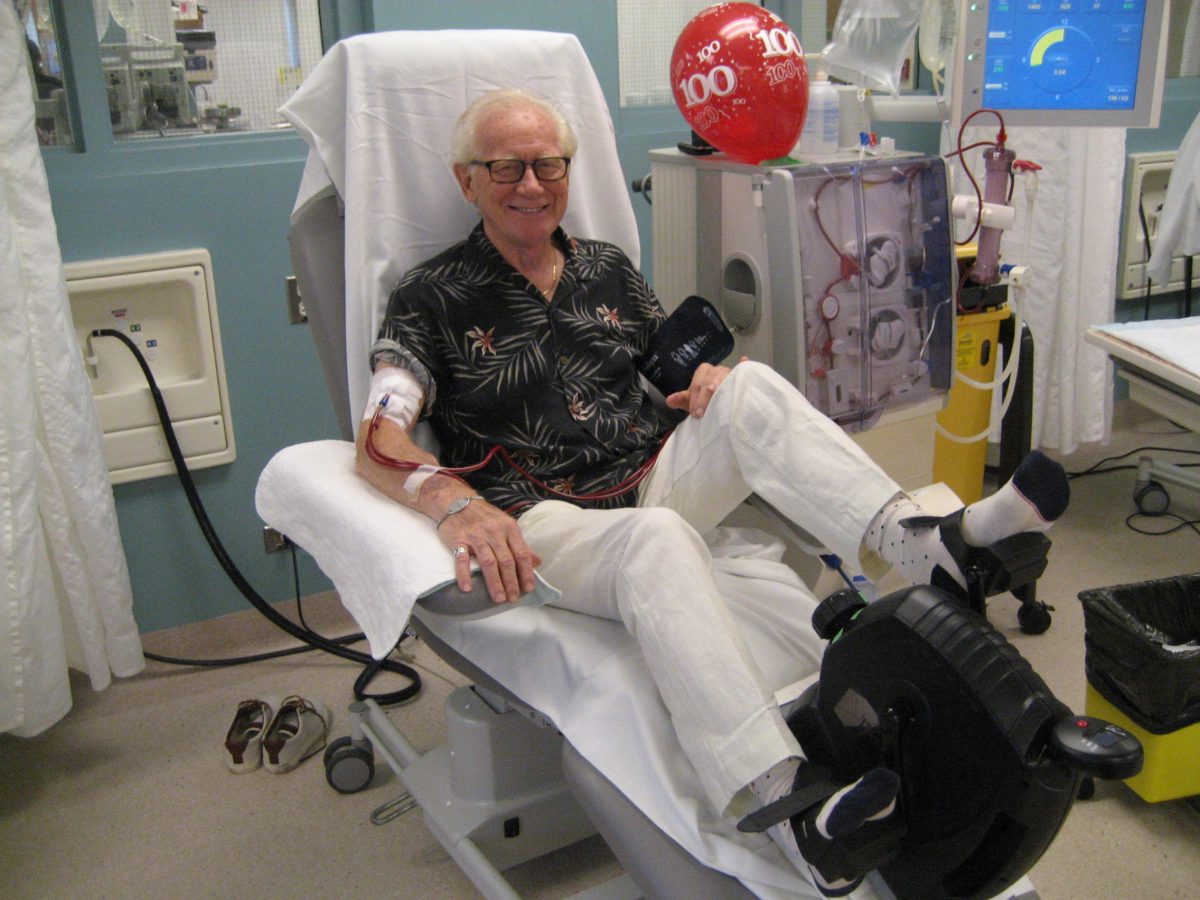
THE BENEFITS OF STATIONARY CYCLING DURING KIDNEY DIALYSIS WILL BE TESTED IN ONE OF THE FUNDED RESEARCH PROJECTS. // PHOTO BY MANITOBA RENAL PROGRAM
Rady Faculty secures $9.5 million in support for health research
Nineteen research projects led by professors from the Rady Faculty of Health Sciences have received a total of $9.5 million in grants from the Canadian Institutes of Health Research.
“Congratulations to the successful applicants in the Fall 2020 round of funding. This is an impressive showing by UM investigators,” said Dr. Peter Nickerson, vice-dean research of the Rady Faculty of Health Sciences.
“Some of these projects focus on improving the lives of people with conditions such as kidney disease, Type 2 diabetes and mental health disorders. Others are lab studies that will advance knowledge about illnesses such as Ebola, leukemia, HIV and metabolic diseases.
“Our researchers are also analyzing data to reveal new evidence about interlinked social and health factors in Manitobans’ lives. And they’re studying areas such as Indigenous-led wellness programs and children’s rehabilitation knowledge sharing in order to identify and build on strengths.”
UM Today recently reported on two of the funded projects, which relate to COVID-19: a randomized trial of a home monitoring platform for patients with chronic kidney disease, led by Dr. Claudio Rigatto, and a study of the lived experiences of families with children who are immunocompromised, led by Dr. Roberta Woodgate.
Here’s a look at the other projects:
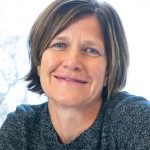
Dr. Clara Bohm, associate professor, internal medicine, Max Rady College of Medicine
Grant: $439,874
Bohm’s team will conduct a randomized trial to assess whether stationary cycling during kidney dialysis treatments reduces heart “stunning” (poor pumping, which can cause heart damage) and improves symptoms such as fatigue. The trial involves participants in Canada, the U.S. and Australia.
 Dr. Shay-Lee Bolton, assistant professor, psychiatry, Max Rady College of Medicine
Dr. Shay-Lee Bolton, assistant professor, psychiatry, Max Rady College of Medicine
Grant: $100,000
Bolton will evaluate whether a psychotherapy and mindfulness program that is delivered virtually helps public safety personnel, such as police officers and firefighters, cope with stress, maintain mental wellness and remain resilient.

Dr. Dan Chateau, assistant professor, community health sciences, Max Rady College of Medicine; research scientist, Manitoba Centre for Health Policy (MCHP)
Dr. Marni Brownell, professor, community health sciences, Max Rady College of Medicine; associate director, research, and senior research scientist, MCHP; researcher, Children’s Hospital Research Institute of Manitoba (CHRIM)
Grant: $432,226
Chateau’s team will use health data to investigate the effects of prescription opioid and psychotropic medication use during pregnancy, looking at patterns of prescription opioid use, short-term effects on children exposed in the womb, and longer-term outcomes for these children.
 Dr. David Collister, assistant professor, internal medicine, Max Rady College of Medicine
Dr. David Collister, assistant professor, internal medicine, Max Rady College of Medicine
Grant: $100,000
Collister’s project is a trial comparing oral and topical nabilone (a synthetic form of cannabis) to placebos to determine whether nabilone is safe and effective at reducing itching in patients who are on dialysis for kidney disease.
 Dr. Shyamala Dakshinamurti, professor, pediatrics and child health, Max Rady College of Medicine; researcher, CHRIM
Dr. Shyamala Dakshinamurti, professor, pediatrics and child health, Max Rady College of Medicine; researcher, CHRIM
Grant: $784,125
This study looks at newborn pulmonary hypertension, which prevents some babies from getting enough bloodflow to their lungs. By focusing on a system of signals in the body called the adenylyl cyclase pathway, Dakshinamurti aims to help these infants’ lungs relax and hearts pump strongly.
 Dr. Allison Dart, associate professor, pediatrics and child health, Max Rady College of Medicine; researcher, CHRIM
Dr. Allison Dart, associate professor, pediatrics and child health, Max Rady College of Medicine; researcher, CHRIM
Dr. Brandy Wicklow, associate professor, pediatrics and child health, Max Rady College of Medicine; researcher, CHRIM
Grant: $1,300,500
Dart and Wicklow will study biopsychosocial risk factors for worsening kidney disease in children and teens with Type 2 diabetes. They will also test a skills-based mental health program to help Indigenous youth with Type 2 diabetes manage their emotions and their disease.
 Dr. Andrew Hatala, associate professor, community health sciences, Max Rady College of Medicine; researcher, CHRIM
Dr. Andrew Hatala, associate professor, community health sciences, Max Rady College of Medicine; researcher, CHRIM
Dr. Sabina Ijaz, family physician; Giigewigamig health advisor
Elder Dave Courchene, founder, Turtle Lodge
Grant: $1,748,025
This team will conduct an Indigenous-led study of the Turtle Lodge in Sagkeeng First Nation as a model of Indigenous education, wellness and flourishing. The objectives include developing a framework for stronger relationships between Indigenous Knowledge Holders and biomedical practitioners.
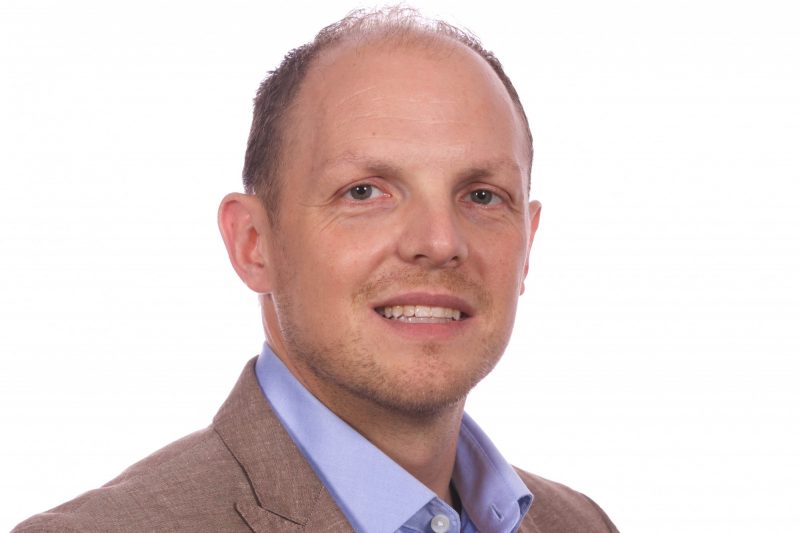 Dr. Jason Kindrachuk, assistant professor, medical microbiology and infectious diseases, Max Rady College of Medicine; Canada Research Chair in molecular pathogenesis of emerging and re-emerging viruses; researcher, CHRIM
Dr. Jason Kindrachuk, assistant professor, medical microbiology and infectious diseases, Max Rady College of Medicine; Canada Research Chair in molecular pathogenesis of emerging and re-emerging viruses; researcher, CHRIM
Grant: $726,750
Kindrachuk’s project focuses on the fact that some men who have recovered from Ebola continue to carry the virus in their reproductive tracts. The study will investigate how the virus persists in the testes and is sexually transmitted. It will also look at Ebola’s long-term effects on reproductive health.
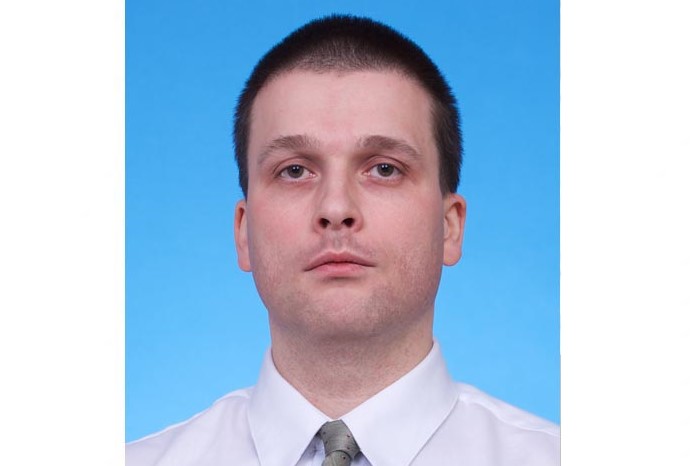 Dr. Ted Lakowski, associate professor, College of Pharmacy
Dr. Ted Lakowski, associate professor, College of Pharmacy
Grant: $699,975
Lakowski’s study aims to develop new cancer therapies that target the specific genes involved in a type of leukemia. These treatments are expected to be more effective and cause fewer side effects than current therapies. The strategy could lead to gene-specific treatments for other cancers.
 Dr. Lyle McKinnon, assistant professor, medical microbiology and infectious diseases, Max Rady College of Medicine; researcher, CHRIM
Dr. Lyle McKinnon, assistant professor, medical microbiology and infectious diseases, Max Rady College of Medicine; researcher, CHRIM
Grant: $100,000
McKinnon will study the role of regulatory T cells, a type of immune cell, in controlling female genital inflammation. Because this inflammation puts women at higher risk of HIV infection, the study is relevant to finding better prevention strategies for women who are at risk of HIV exposure.
 Dr. Suresh Mishra, professor, internal medicine, Max Rady College of Medicine
Dr. Suresh Mishra, professor, internal medicine, Max Rady College of Medicine
Grant: $100,000
Mishra will focus on prohibitin, a protein that plays an important role in sex differences in fat and immune cells. Using mouse models, he will investigate why men and women display differences in susceptibility and resistance to metabolic and immune diseases.
 Dr. Rae Spiwak, assistant professor, surgery, Max Rady College of Medicine
Dr. Rae Spiwak, assistant professor, surgery, Max Rady College of Medicine
Grant: $60,000
Spiwak will use Manitoba data to investigate what social factors place children at greater risk for physical injury. The study will look at a cohort of children who were hospitalized for traumatic physical injury and compare them with uninjured children, examining factors such as parental socioeconomic status and education.
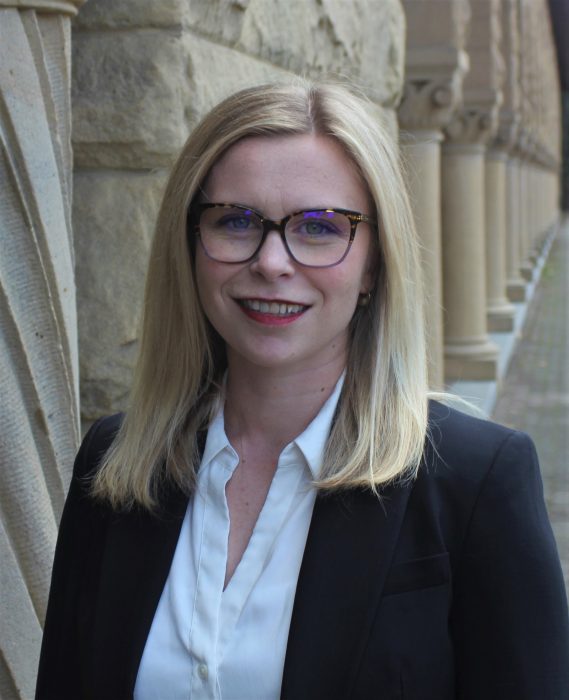 Dr. Elizabeth Wall-Wieler, assistant professor, community health sciences, Max Rady College of Medicine; research scientist, MCHP; Canada Research Chair in population data analytics and data curation
Dr. Elizabeth Wall-Wieler, assistant professor, community health sciences, Max Rady College of Medicine; research scientist, MCHP; Canada Research Chair in population data analytics and data curation
Dr. Marilyn Bennett, assistant professor, Faculty of Social Work
Dr. Marni Brownell, professor, community health sciences, Max Rady College of Medicine; associate director, research, and senior research scientist, MCHP; researcher, CHRIM
Dr. Marcelo Urquia, associate professor, community health sciences, Max Rady College of Medicine; research scientist, MCHP; Canada Research Chair in applied population health
Grant: $393,976
Wall-Wieler’s team will analyze Manitoba data to determine whether parents with specific health conditions are more likely to have a child taken into care, and how having a child taken into care affects parents’ health. The study will compare First Nations, Métis and all other Manitoban parents.
 Dr. Jun-Feng Wang, associate professor, pharmacology and therapeutics, Max Rady College of Medicine
Dr. Jun-Feng Wang, associate professor, pharmacology and therapeutics, Max Rady College of Medicine
Grant: $623,475
Wang will investigate the role of a protein, Txnip, in chronic stress-induced neuronal dysfunction. The research will use an animal model for depression, aiming to determine if inhibiting Txnip could be used in treating human depression.
 Dr. Brandy Wicklow, associate professor, pediatrics and child health, Max Rady College of Medicine; researcher, CHRIM
Dr. Brandy Wicklow, associate professor, pediatrics and child health, Max Rady College of Medicine; researcher, CHRIM
Grant: $100,000
Wicklow will examine beta cell and kidney function in First Nations children whose mothers were diagnosed as children with Type 2 diabetes. The offspring will be studied in early childhood and compared with children not exposed to Type 2 diabetes in the womb. The results will contribute to strategies for early intervention.
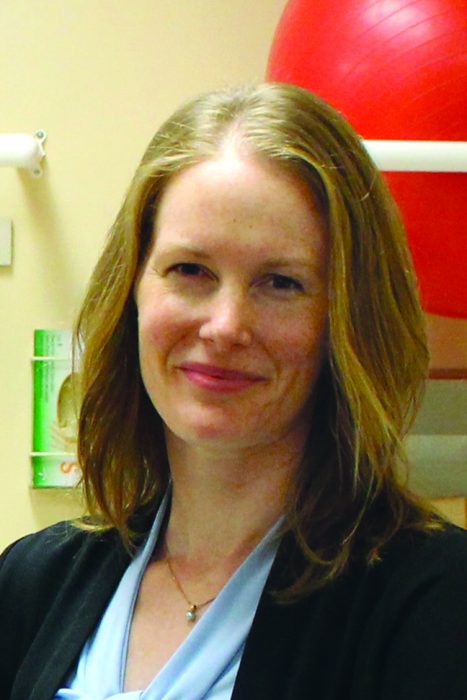 Dr. Kristy Wittmeier, assistant professor, pediatrics and child health, Max Rady College of Medicine; researcher, CHRIM
Dr. Kristy Wittmeier, assistant professor, pediatrics and child health, Max Rady College of Medicine; researcher, CHRIM
Grant: $100,000
Wittmeier’s team will study how knowledge about research and treatments is shared via networks between researchers, therapists and families of children with development or rehabilitation needs. The goal is to identify strengths and gaps in these knowledge-sharing networks and make recommendations to improve them.
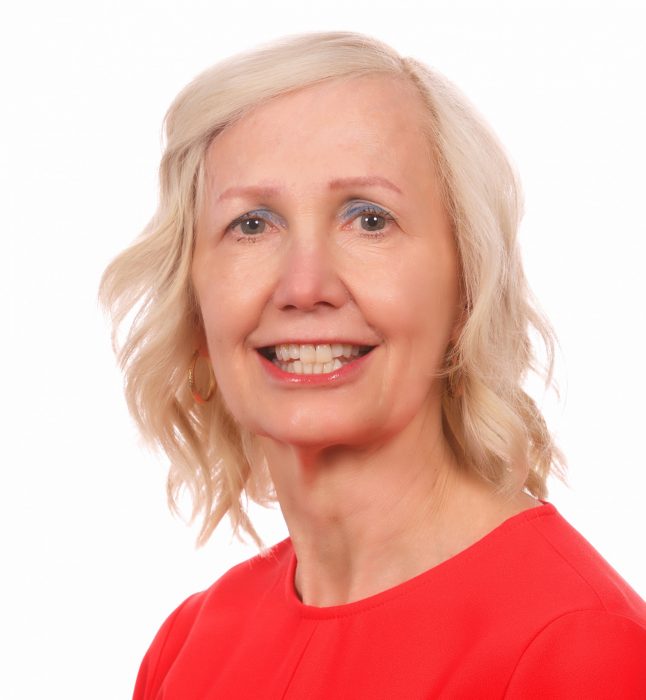 Dr. Roberta Woodgate, distinguished professor, College of Nursing; Canada Research Chair in child and family engagement in health research and healthcare; researcher, CHRIM
Dr. Roberta Woodgate, distinguished professor, College of Nursing; Canada Research Chair in child and family engagement in health research and healthcare; researcher, CHRIM
Grant: $761,176
Woodgate’s study will involve young immigrants and refugees in co-designing culturally sensitive mental health supports for youth like themselves. Parents and community-based organizations will also participate. The researchers will develop a digital mental health self-management prototype.






